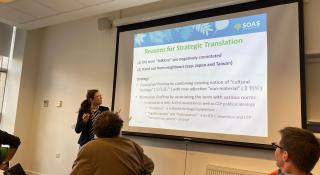
Breadcrumbs navigation
Banalities, dissent, and support
Dr Terri-Anne Teo and Dr Elisa Wynne-Hughes write the fifth blog in our 'Gender, Race, and the Intersections of Precarity' special series. They discuss their experiences as migrants working in the UK Higher Education system. Continuing the work flowing from our 2021 BISA and PSA report 'Career trajectories in UK departments of Politics and International Relations', Dr Skyler Hawkins (Newcastle University) coordinated this series to give real faces and experiences to the key statistical findings.
This blog is about our experiences as non-UK and non-EU academics in the UK. To caveat from the outset, we recognise that we are both in extremely privileged positions. We are fortunate enough to both have open-ended jobs. We are from Canada and Singapore, countries deemed ‘safe’, so we are not on the UK list requiring you to register with the police if you intend to stay longer than six months. We are both financially comfortable. Elisa is white and has a British partner. We have not been threatened with deportation, experienced discriminatory monitoring as staff, or been unable to travel entirely. Nonetheless, our experiences left us feeling isolated, anxious and paralysed at different points in our careers. This blog is based on our experiences - we discuss how being a migrant affects our everyday lives and offer some suggestions to mitigate the hurdles we faced.
Banalities
Elisa: When I got a limited-term position after my PhD, I was really happy but also worried that the university was not carrying out the process required on their end for my Tier 2 (skilled worker) visa application, despite assurances to the contrary from my line manager. In a panic, I applied separately for a Doctoral Extension Scheme visa as a back-up. In the end, I did not get my Tier 2 visa in time, and would have had to leave the country had it not been for my back-up visa. Having a British partner did not mean that I could automatically stay in the UK, as he was a PhD student and not making the £18,600 required to keep me in the country on a work visa. These visa applications and renewals take a lot of time (if you don’t pay the extra fees) and cause a lot of stress, particularly if you don’t get them in time to attend an event (like a conference or wedding) or if there is a family emergency.
Terri: Yes, I missed visiting my family at Christmas one year because my student visa didn’t arrive in time during my PhD. When I got a job in the UK, I moved from Singapore during the pandemic – a time when logistics costs skyrocketed. Relocation allowances were fixed or at least difficult to negotiate. Worrying over the affordability of moving was made more complex by the gratitude I felt for being offered a position, and guilt with the awareness that others were not. In hindsight, it seems unfair that these are questions occupied me mainly because I was based outside of the UK, making my departure from home more fraught.
Elisa: When I applied for indefinite leave to remain (ILR) – which you can do after five years on a Tier 2 visa – the lack of support and information from the university contributed to an already stressful process. Visa applications require filling out various forms with questions that are ambiguous and don’t cater to staff with complex situations. When I contacted the university for help, they referred me to an immigration lawyer (minimum £1750 fee). I didn’t realise how much of a financial and emotional burden this was for me over the years until I received my ILR visa.
Dissent
Terri: The issue of ILR also came up during recent UCU strikes. While supporting industrial action, it is unclear what impact this decision will have on my present visa and future visa-related applications. There are protections for Tier 2 migrants against being penalised in applications for ILR. This said, being a migration scholar and a migrant who has experienced pre- and post-Brexit Britain, I’m well-aware of the changeability of immigration laws.
The UCU website provides clarity at present, but not for the future. It states that industrial action should have no direct or indirect impact on ILR applications, but the next point states that one should seek legal advice if they feel their ILR application was turned down for that reason. This implies there is the possibility for this happening – a possibility that UK citizens do not have to be concerned with. This existential uncertainty, in an already worrying situation where our pay and pensions are at stake, is one that makes decisions to take industrial action more complex for myself and friends in similar positions, and affects opportunities to act as critical academics and citizens.
Support
Terri and Elisa: There are financial and non-financial costs to migration, many of which we initially took on willingly – or unwittingly – because we were so grateful to have jobs. Considering that universities want to encourage internationalisation, it seems strange that universities largely ignore these issues. In our experiences, universities see staff as responsible for their visa application process. While the process of visa applications is done through the home office, universities still need to have a clear process in place to support international staff. We suggest the following:
Help with visa costs
At present, a Tier 2 visa costs £3,295 for three years including an NHS surcharge (£624 per year) - these costs are often not covered by universities. After the five years of being on a Tier 2 visa, most staff apply for ILR. To apply, the following conditions need to be met (this is before factoring costs for partners/children):
- Earn over £25,600 per year.
- Afford the application costs of £2,389.
- Pay extra costs like biometric fees, fees to take the ‘Living in the UK Test’, fees to book an appointment, and fees to get faster decisions on your visa (which can otherwise take up to 6 months).
- You need to have worked in the UK for five years (or be married to a UK citizen for 3 years), so you will have applied for a five-year visa costing £4,340 total or 2 three-year Tier 2 visas, costing £6,590 in total (if you started out on a limited term contract like Elisa did).
- Prove you have a certain amount of money in your bank account (approx. £1,000 per person which needs to have been in the same account for a month) so that you can support yourself.
Workload time
Being a migrant involves time-consuming processes. They involve filling in long forms, attending meetings to gather biometric data to process your application, and studying for and taking the ‘Living in the UK Test’ (for ILR). We also feel responsible for clarifying how participating in industrial action will affect us in future. An acknowledgement that this work needs to happen, so academics can continue working at the institution, could take the form of factoring in workload time.
Information and advice
We request that universities take responsibility for providing support in terms of information for staff applying for visas. We also ask that line managers have the required information to support their international staff who may have questions or requests with regards to visas. In the context of the ongoing UCU strike, early career academics, academics on probation and/or those on student and work visas need to know if and/or how they will be affected in terms of their future, and longer-term residence or citizenship applications.
We have found support in other areas, which we hope will be useful for those in similar situations. Some staff are organising on Twitter to protests these conditions. We fully support the manifesto of the Twitter group ‘International and Broke’, (@intnlandbroke) which states, ‘1) unis must pay the immigration costs of migrant staff and their families, 2) unis must provide migrant staff with reliable legal advice; and 3) unis must stop unfriendly and discriminatory monitoring of migrant staff’.
Photo by ConvertKit on Unsplash


